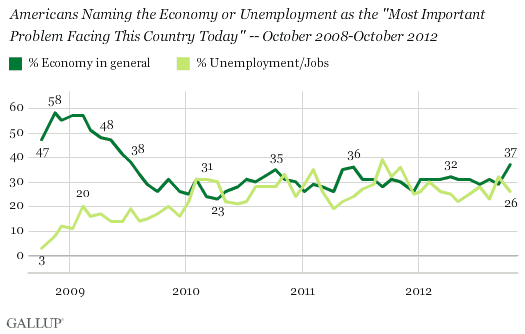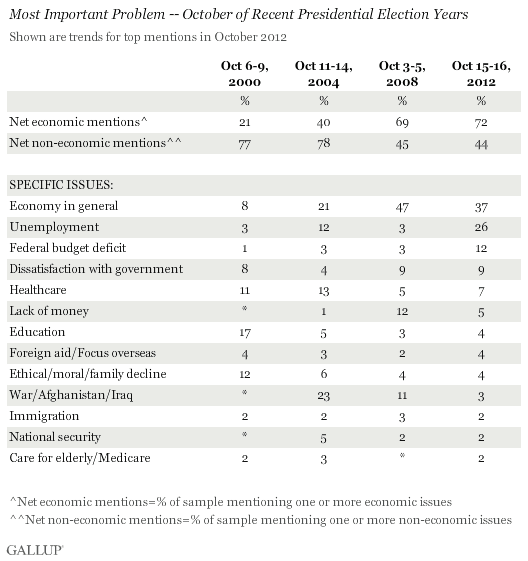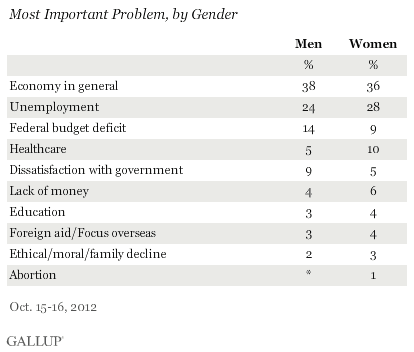PRINCETON, NJ -- The "economy in general" ranks No. 1 on Gallup's Most Important Problem list in October, with 37% of Americans saying it is the top issue facing the country. This is up from 29% in September and exceeds unemployment, in second place at 26%. Mentions of unemployment are down this month from 32% in September, likely reflecting the recent decline in the government's jobless rate to 7.8%.

Democrats, independents, and Republicans all became more likely to name the economy as the nation's top problem in October; however, the increase was sharpest among Republicans, rising 14 percentage points, from 30% to 44%. That contrasts with a five-point increase among independents (from 32% to 37%) and a seven-point increase among Democrats (from 26% to 33%).
The federal budget deficit currently ranks third on Gallup's Most Important Problem list, at 12%, followed by dissatisfaction with government at 9%, healthcare at 7%, and "lack of money" at 5%. No other issue is named by as much as 5% of Americans.
Current Issue Ranking Similar to 2008, Different Than 2004 and 2000
The economy in general was a more prominent concern for Americans four years ago, on the eve of the 2008 presidential election, than it is today. At that time, the percentage mentioning the economy approached 50% or more. However, unemployment was a much lesser concern then than now (12% in October 2008 vs. 26% today), as was the federal budget deficit (3% vs. 12%). Thus, when factoring in all types of economic issues that are mentioned, including unemployment, the federal budget deficit, and taxes, among others, the percentage of net economic mentions is actually slightly higher today: 72% vs. 69%.
The current emphasis on economic concerns stands in stark contrast to the 2004 and 2000 elections, when less than half of Americans named any type of economic issue as the nation's top problem. Net economic mentions stood at 40% in October 2004 and 21% in October 2000, while percentages of specific mentions of the economy in general were even lower (at 21% and 8%, respectively).
Several issues are far less important to Americans today than they were in one or more of the previous three presidential elections. These include the war in Iraq, mentioned by substantial percentages of Americans in 2004 and 2008; healthcare, which was a more prominent concern in 2000 and 2004; and education, which was of particular concern in 2000.

Men and Women Have Similar Perspectives on Top Problem
President Obama and Republican presidential candidate Mitt Romney have both made concerted efforts to appeal to female voters in this election cycle, often with a heavy focus on women-centric issues such as abortion, birth control, and, more recently, gender equity in the workplace. However, women and men put nearly identical emphasis on the economy and unemployment as the nation's most important problems, suggesting that these are the issues they will consider most when voting.
Beyond these top two issues, men put slightly more emphasis on the federal budget deficit, while women are more likely to name healthcare. Abortion was the top issue named by women voters in 12 key swing states as "the most important issue for women in this election," according to a recent USA Today/Gallup poll. By contrast, 1% of women and less than 1% of men, nationally, consider it the most important problem facing the nation.

Bottom Line
The economy is the dominant issue for Americans heading into the November election and is nearly as important to Americans today as it was at this stage of the 2008 presidential election cycle. The obvious difference is that this time an incumbent president is seeking a second term -- four years ago, both candidates were asking Americans to trust their economic policies without the benefit or liability of a presidential record to run on. The continued dominance of the economy as uppermost on Americans' minds contrasts sharply with 2004 and 2000, when non-economic issues -- the war in Iraq, healthcare, terrorism, education, and dissatisfaction with government, among others -- were most prominent.
Survey Methods
Results for this Gallup poll are based on telephone interviews conducted Oct. 15-16, 2012, on the Gallup Daily tracking survey, with a random sample of 1,004 adults, aged 18 and older, living in all 50 U.S. states and the District of Columbia.
For results based on the total sample of national adults, one can say with 95% confidence that the maximum margin of sampling error is ±4 percentage points.
Interviews are conducted with respondents on landline telephones and cellular phones, with interviews conducted in Spanish for respondents who are primarily Spanish-speaking. Each sample includes a minimum quota of 400 cell phone respondents and 600 landline respondents per 1,000 national adults, with additional minimum quotas among landline respondents by region. Landline telephone numbers are chosen at random among listed telephone numbers. Cell phone numbers are selected using random-digit-dial methods. Landline respondents are chosen at random within each household on the basis of which member had the most recent birthday.
Samples are weighted by gender, age, race, Hispanic ethnicity, education, region, adults in the household, and phone status (cell phone only/landline only/both, cell phone mostly, and having an unlisted landline number). Demographic weighting targets are based on the March 2011 Current Population Survey figures for the aged 18 and older non-institutionalized population living in U.S. telephone households. All reported margins of sampling error include the computed design effects for weighting and sample design.
In addition to sampling error, question wording and practical difficulties in conducting surveys can introduce error or bias into the findings of public opinion polls.
View methodology, full question results, and trend data.
For more details on Gallup's polling methodology, visit https://www.gallup.com/.
